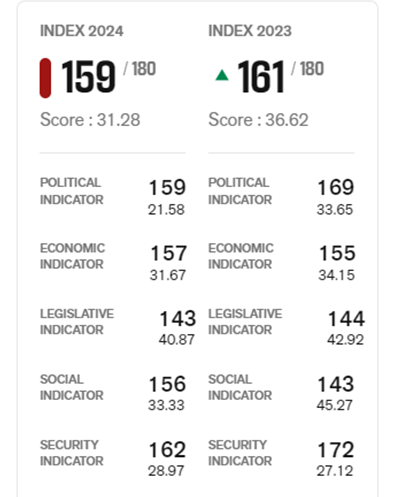- Courses
- GS Full Course 1 Year
- GS Full Course 2 Year
- GS Full Course 3 Year
- GS Full Course Till Selection
- MEP (Mains Enrichment Programme) Data, Facts
- Essay Target – 150+ Marks
- Online Program
- GS Recorded Course
- NCERT- First Ladder
- Polity
- Geography
- Economy
- Ancient, Medieval and Art & Culture AMAC
- Modern India, Post Independence & World History
- Environment
- Governance
- Science & Technology
- International Relations and Internal Security
- Disaster Management
- Ethics
- Current Affairs
- Indian Society and Social Issue
- CSAT
- 5 LAYERED ARJUNA Mentorship
- Public Administration Optional
- ABOUT US
- OUR TOPPERS
- TEST SERIES
- FREE STUDY MATERIAL
- VIDEOS
- CONTACT US
World Press Freedom Index 2024: India's Score Declines
World Press Freedom Index 2024: India's Score Declines
07-05-2024
India's press freedom score fell in the World Press Freedom Index 2024, reflecting a broader global trend of declining press freedom.
About the World Press Freedom Index 2024:

- The World Press Freedom Index is an annual report published by the global media watchdog Reporters Without Borders (RSF).
- The index ranks 180 countries based on the ability of journalists to work freely and independently.
- It comprises 5 categories:
- political context,
- legal framework,
- economic context,
- sociocultural context, and
- security.
- The index focuses on only press freedom and does not assess the quality of journalism or general human rights violations.
Key Findings of the 2024 Index:
- There has been an overall decline in press freedom globally, with an average drop of 7.6 points across countries.
- Norway topped the ranking, followed by Denmark.
- Countries with "good" press freedom are primarily located in Europe, particularly within the European Union, which has adopted the European Media Freedom Act (EMFA).
- The Maghreb and Middle East regions experienced the most severe restrictions on press freedom imposed by government forces.
- Eritrea ranked at the bottom of the list, just ahead of Syria.
India's Ranking and Performance:
- India's rank improved slightly from 161 in 2023 to 159 in 2024, primarily due to the decline in press freedom in other countries.
- India's scores declined in all categories except for the security indicator.
- India ranks behind Turkey (158), Pakistan (152), and Sri Lanka (150) in terms of press freedom.
Challenges in 2024 Election Year
- The year 2024, with major global elections, has highlighted a decline in political support for press freedom.
- Instances of violence against journalists during elections have been reported in various countries like Nigeria and the Democratic Republic of Congo.
Impact of Disinformation and AI
- The use of generative AI, including deepfakes, is a growing concern in influencing election outcomes through disinformation campaigns.
- Governments are intensifying control over social media and the internet, restricting access and suppressing dissenting voices.
Regional Overview
- Europe: Press freedom conditions vary, with Eastern European countries adopting repressive methods similar to Russia.
- Americas: Journalists face risks covering topics like crime and corruption, with a decline in press freedom in South America.
- Africa: Political violence during elections has affected press freedom in Sub-Saharan Africa, with increased repression in countries like Nigeria and Madagascar.
- Asia-Pacific: Countries like Myanmar, China, North Korea, and Afghanistan are among the most dangerous for journalists.
- Middle East and North Africa: Several countries exhibit a "very serious" situation for press freedom, including Palestine, Iraq, and Syria.
Best and Worst Performers
- Norway remains at the top of the index, but political scores have declined globally.
- Countries like Afghanistan, Syria, and Eritrea shows severe challenges, with record numbers of journalists detained or missing.
What is the European Media Freedom Act (EMFA)?
- The European Media Freedom Act (EMFA) is a proposed law in the European Union aimed at establishing a common framework for media services within the EU's internal market.
- It introduces measures to protect journalists and media providers from political interference and facilitates their operations across EU borders.
- The new rules will ensure citizens' right to access free and pluralistic information and define the responsibilities of Member States in providing a good environment for freedom of the press.
Must Check: Best IAS Coaching In Delhi



